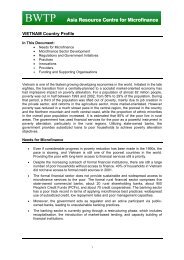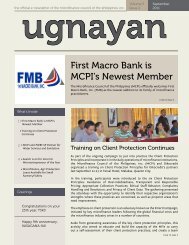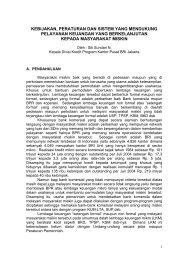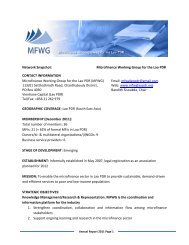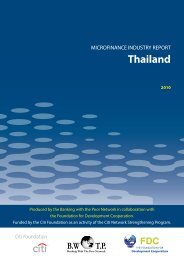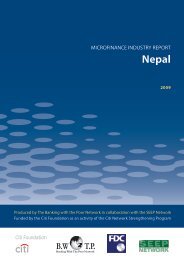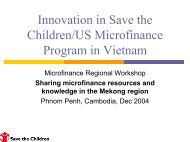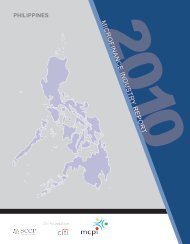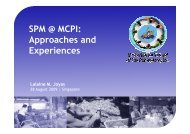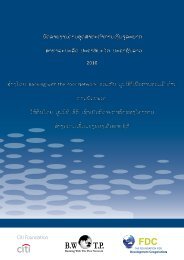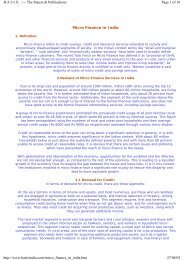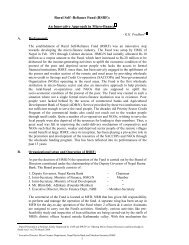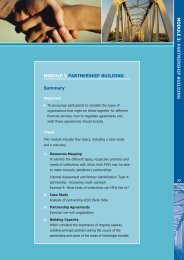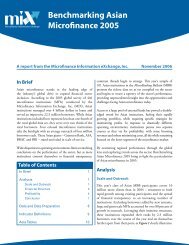Microfinance Industry Report: Indonesia - Banking with the Poor ...
Microfinance Industry Report: Indonesia - Banking with the Poor ...
Microfinance Industry Report: Indonesia - Banking with the Poor ...
You also want an ePaper? Increase the reach of your titles
YUMPU automatically turns print PDFs into web optimized ePapers that Google loves.
exist; <strong>the</strong> credit and savings cooperatives, Koperasi<br />
Simpan Pinjam (KSP), and <strong>the</strong> savings and credit<br />
units (Unit Simpan Pinjam, USP) of multipurpose<br />
cooperatives. Most cooperatives are subsidised<br />
through <strong>the</strong>ir involvement in government credit<br />
programs. However, a few grassroots cooperatives<br />
have demonstrated stronger results. After <strong>the</strong> fall of<br />
Suharto in 1998 <strong>the</strong> repressive government control<br />
of cooperatives was loosened and independent<br />
cooperatives have begun to emerge.<br />
The independent Credit Union Movement, supported<br />
by <strong>the</strong> Credit Union Coordination Board of <strong>Indonesia</strong><br />
(Badan Kordinasi Koperasi Kredit or BK3I), appears<br />
to be more successful in nurturing independent<br />
and sustainable cooperative financial institutions.<br />
It has links <strong>with</strong>, and has been assisted by, various<br />
foreign cooperative movements. In 2004, INKOPDIT<br />
(Induk Koperasi Kredit) or <strong>the</strong> Credit Union Central<br />
of <strong>Indonesia</strong> also started a microfinance program to<br />
build <strong>the</strong> capacity of self-help groups to transform<br />
<strong>the</strong>mselves into cooperatives. Some independent<br />
financial cooperatives are organized on Syariah<br />
principles and <strong>the</strong>re is also a ‘pre-cooperative’ form<br />
of Syariah organisation, <strong>the</strong> BMT, which conducts<br />
savings and loan operations. The BMT is analogous<br />
to a self-help group. A state-established ‘secondtier’<br />
institution, Permodalan Nasional Madani (PNM)<br />
provides loanable funds and capacity-building<br />
assistance for many of <strong>the</strong>se Islamic financial<br />
institutions.<br />
For historical reasons, having to do <strong>with</strong> <strong>the</strong> Suharto<br />
regime’s discouragement of independent social<br />
action, NGOs have played a relatively small role<br />
in <strong>Indonesia</strong>n microfinance. Compared <strong>with</strong> <strong>the</strong><br />
large commercial operators in <strong>the</strong> field, NGO client<br />
numbers are generally very small. They can however<br />
deal <strong>with</strong> large numbers when providing nonfinancial<br />
services to assist government mass credit<br />
programs. For example, government programs<br />
use NGOs to facilitate <strong>the</strong> formation of self-help<br />
groups as conduits for microfinance services, usually<br />
provided by commercial banks such as Bank BRI.<br />
They usually mobilise savings, which are deposited in<br />
a BRI account, which will in turn channel subsidised<br />
government loans to <strong>the</strong> groups.<br />
At present, <strong>the</strong> great majority of financial-service<br />
NGOs remain unsustainable and dependent on<br />
government or donor funds to operate. A few NGOs,<br />
such as <strong>the</strong> large Bina Swadaya organisation, have<br />
ventured into commercial microfinance by setting<br />
up <strong>the</strong>ir own BPRs. At least one commercial bank<br />
is operated by an NGO, Yayasan Purba Danarta in<br />
Central Java. O<strong>the</strong>r NGOs use a modified Grameen<br />
Bank methodology.<br />
Yayasan Mitra Usaha (YMU) is an example of an<br />
organisation which has adopted <strong>the</strong> Grameen<br />
approach and now reaches 12,000 clients. Mitra<br />
Bisnis Keluarga (MBK), or “Family Business Partners”, is<br />
a microfinance institution also employing Grameen<br />
methods and regulated by <strong>the</strong> Ministry of Finance as<br />
a non-bank finance company. Currently it operates<br />
in six rural districts in Java and reaches nearly 80,000<br />
members as of April 2008. MBK is <strong>the</strong> fastest growing<br />
and largest NGO-MFI in <strong>Indonesia</strong> and serves women<br />
exclusively.<br />
Bina Swadaya (Self-Reliance Development<br />
Foundation) has helped self-help groups in many<br />
of <strong>the</strong> most disadvantaged areas of <strong>the</strong> country to<br />
link up <strong>with</strong> banks. It worked in <strong>the</strong> poorest villages<br />
identified by <strong>the</strong> IDT government program of <strong>the</strong><br />
1990s. Bina Swadaya has also set up its own BPRs and<br />
since 2002 has adapted <strong>the</strong> ASA methodology from<br />
Bangladesh in 7 of its 21 branches. Bina Swadaya has<br />
been a focal point for <strong>the</strong> articulation of microfinance<br />
concerns, being closely associated <strong>with</strong> GEMA PKM,<br />
a national forum for microfinance stakeholders.<br />
The GEMA conducted a survey of 55 microfinance<br />
institutions <strong>with</strong> Mercy Corps, an international<br />
NGO active in <strong>Indonesia</strong>. This identified a demand<br />
for wholesale funding and technical services for<br />
microfinance, as well as for rating services among<br />
more advanced MFIs.<br />
16 microfinance industry report - INDONESIA<br />
<strong>Indonesia</strong>_<strong>Report</strong>_forprint.indd 16<br />
27/05/2009 3:14:43 PM



